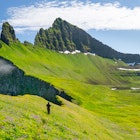
Nova Scotia's Cliffs of Fundy are now a UNESCO Global Geopark
Jul 14, 2020 • 3 min read

Cape Blomidon in the Bay of Fundy, Nova Scotia © Chris Sheppard / 500px / Getty Images
Just as many tourists are turning to outdoor recreation amidst the global COVID-19 pandemic, UNESCO has designated Nova Scotia's Cliffs of Fundy a global geopark. That distinction acknowledges the unique geologic and cultural significance of this coastal corner, of which 165km is preserved near the Bay of Fundy's Minas Basin.
Though the Bay of Fundy isn't widely known, it does have a connection to nearly every continent on earth. That's because the landscape at the Cliffs of Fundy tells the story of ancient geologic forces that continue to shape the world as we know it, from the jagged Atlantic coast of North America to Australia's far-flung Gold Coast.
"There's nowhere else on planet Earth where you can see the record of the assembly of a supercontinent 300 million years ago, called Pangea, and its breakup 100 million years later, which was the birth of the modern world," John Calder, senior geologist and Cliffs of Fundy board member, told the CBC Canadian Broadcasting Corporation.

The Bay of Fundy continues to be shaped by monumental forces. The titular cliffs were created by the highest tides on earth – which can crest to a peak of 5 stories tall on their way in and retreat out so far that the seafloor is visible.
The cold waters of the North Atlantic have carved a cross-section of ancient rocks that reveal how what is now Africa tore away from North America in the late Triassic period, creating low rift basins like the Minas, around which the geopark is situated. Those rifts spewed some of the largest lava flows in earth's history, creating huge basalt headlands that can still be seen along the Bay of Fundy, as well as in such seemingly unrelated places as the Atlas Mountains of Morocco.
Unsurprisingly, the Cliffs of Fundy geopark is also a hotbed for fossils. For millions of years, a wide variety of fauna have been attracted to the Minas Basin, and the Cliffs provide layered records of the rise and fall of the dinosaurs and the emergence of early vertebrates and mammals that preceded today's variety of seabirds, sea lions, and whales.
As recently as July 2020, a Nova Scotian woman named Erin Levy stumbled across a 310 million-year-old fossil at the nearby Joggins Fossil Cliffs, also recognized by UNESCO, albeit as a World Heritage Site. A rock that Levy pulled out of the sand turned out to have two sets of footprints from an early amphibian and an early arthropod – just one of many such finds along the Bay of Fundy.

At least 13,000 years ago, some of North America's earliest human inhabitants settled in Nova Scotia. The Mi’kmaq nation spent the summers here fishing and hunting, and the area continues to have deep significance for the indigenous community. The history of the Mi'kmaq people is shared through archeological finds and other materials at the Mi'kmawey Debert National Historic Site, and eventually at a Cultural Center that is under development by the Confederacy of Mainland Mi’kmaq.
The Mi'kmawey Debert National Historic Site is one of forty geosites within the Cliffs of Fundy Geopark. Other sites take the form of trails like the Kenomee network and those at Cape Cignecto Provincial Park, and Five Islands Provincial Park, as well as points of geologic interest like the Old Wife, Cobequid Fault and Triassic-Jurassic Fault, the former Londonderry Iron Mines, and old shipyards like the Age of Sail Heritage Center.
The Cliffs of Fundy UNESCO geopark can be reached from Halifax by car in about two hours, with most visitors staying in Parrsboro (home to the Fundy Geologic Museum), Wolfville, or Truro. There are a variety of local lodging and restaurants, as well as outfitters where you can rent a kayak or book a guided tour.
You might also like:
Stay in a luxury train-hotel on a bridge over Kruger National Park
Camping in Canada’s national parks is reopening – with conditions
New Zealand's most scenic day hikes
Explore related stories

Hiking
The 5 best treks in Morocco for wildlife, Roman ruins and mountain summitsFeb 8, 2023 • 5 min read







 Public TransportShake, rattle and woah: the world’s most beautiful bus rides
Public TransportShake, rattle and woah: the world’s most beautiful bus ridesNov 27, 2019 • 7 min read

